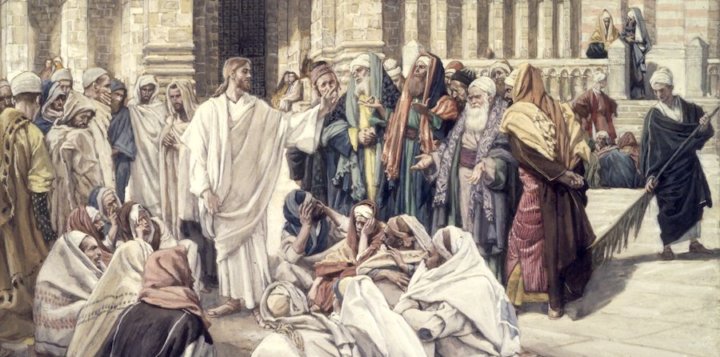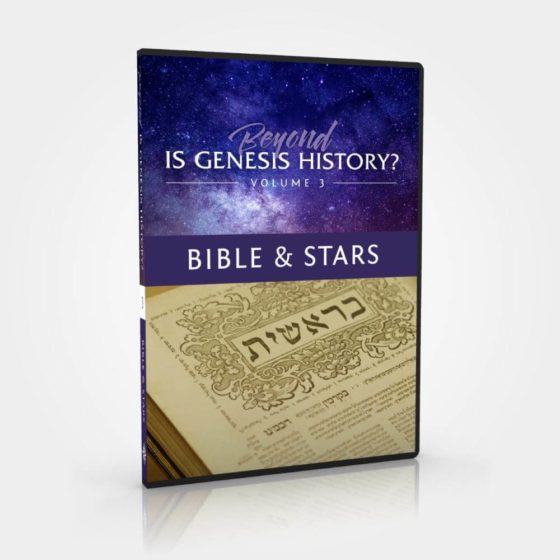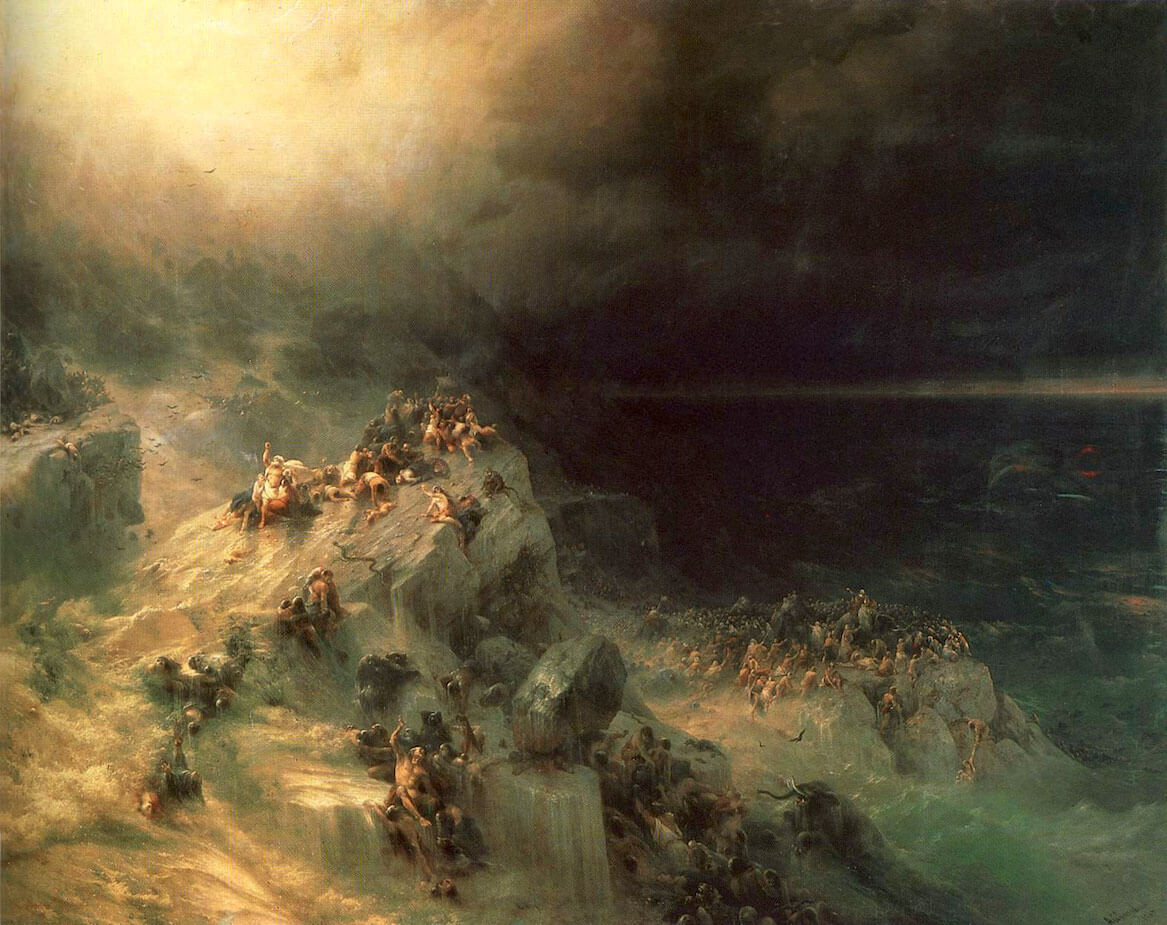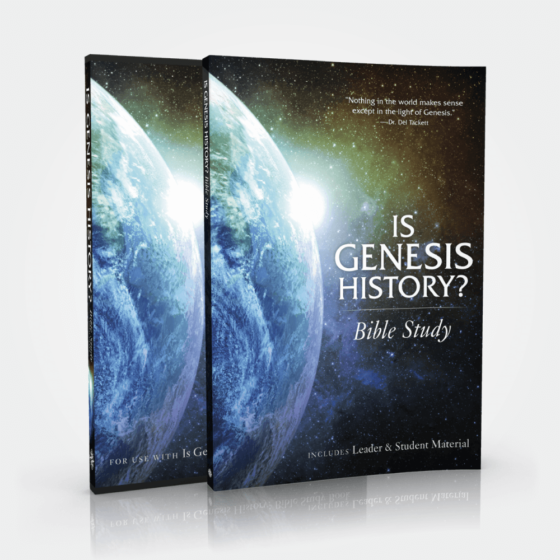Learn more with Beyond Is Genesis History? Vol 3 – Bible & Stars
Using scripture to interpret scripture is essential to understanding the Bible. Most of the people and events in the first chapters of Genesis are referred back to by both Old and New Testament authors. Even more importantly, Jesus Himself spoke often about Genesis.
It is these divinely-inspired statements that provide the interpretive framework for recognizing the historicity of Genesis. Three things become apparent when looking at these passages:
- The Biblical authors saw the events and people of Genesis as real history.
- They understood those historical events had spiritual and theological consequences.
- They realized those consequences continue to have an impact on the present day.
Since it is helpful to read what was actually said, here are some of the more important statements about Genesis.
Moses & Isaiah
“For in six days the Lord made heaven and earth, the sea, and all that is in them, and rested on the seventh day. Therefore the Lord blessed the Sabbath day and made it holy.” – Exodus 20:11
“Therefore the people of Israel shall keep the Sabbath, observing the Sabbath throughout their generations, as a covenant forever. It is a sign forever between me and the people of Israel that in six days the Lord made heaven and earth, and on the seventh day he rested and was refreshed.’” – Exodus 31:16-17
These two passages from Moses tell us that God intentionally created the world in six normal days then rested on the seventh in order to provide a chronological pattern for our normal week of work. They also clarify that the days of Genesis 1 cannot be interpreted as long ages, for the first Sabbath rest and the weekly Sabbath rest are the same amount of time: one day. As Moses records in Leviticus, understanding the timeframe of the Sabbath could be a life and death issue.

“I made the earth and created man on it; it was my hands that stretched out the heavens, and I commanded all their host”….For thus says the Lord, who created the heavens (he is God!), who formed the earth and made it (he established it; he did not create it empty, he formed it to be inhabited!): “I am the Lord, and there is no other.” – Isaiah 45:12,18
Here God explains that He created the earth in order to be inhabited by man, and that He didn’t create it to be empty. This passage shows that the earth did not form slowly from bits of planetary rock over millions of years then sit empty and barren for 4.5 billion years before man appeared. Rather, the earth was created and man placed on it just a few days later (specifically the sixth day of creation).
“This is like the days of Noah to me: as I swore that the waters of Noah should no more go over the earth, so I have sworn that I will not be angry with you, and will not rebuke you. For the mountains may depart and the hills be removed, but my steadfast love shall not depart from you, and my covenant of peace shall not be removed,” says the Lord, who has compassion on you.” – Isaiah 54:9-10
Isaiah refers back to God’s covenant promise to Noah when He graciously promised not to flood the entire earth as a result of His anger. In the same way, He promises to have compassion on Israel even after they have been judged and punished.
Jesus
Jesus, when he began his ministry, was about thirty years of age, being the son (as was supposed) of Joseph, the son of Heli…the son of Enos, the son of Seth, the son of Adam, the son of God. And Jesus, full of the Holy Spirit, returned from the Jordan and was led by the Spirit in the wilderness for forty days, being tempted by the devil. – Luke 3:23,38-4:1
Luke provides the longest genealogy for Jesus by tracing His lineage back to Adam. It is no coincidence that he follows it with Jesus’ temptation. Where the first son fell to Satan in a beautiful garden, the last Son triumphed over him in a desolate wilderness. Luke wants us to understand that the primary reason Jesus came to earth was to undo the destruction and death resulting from Satan’s first temptation: a real event with real consequences that occurred near ‘the beginning of creation.’

And Jesus said to them… “But from the beginning of creation, ‘God made them male and female.’ Therefore a man shall leave his father and mother and hold fast to his wife, and the two shall become one flesh.’ So they are no longer two but one flesh. What therefore God has joined together, let not man separate.” – Mark 10:5,6-9
When Jesus is asked about divorce, He explains God’s hatred of it by observing a number of historical facts from Genesis: God made the first man and woman at the beginning of time (there were no long ages before them); He created them distinctly male and female; He designed them to have sex with each other; and He joined them in marriage in the garden. In fact, Jesus’ entire argument about marriage hinges on the historicity of these two people and events.
And [Jesus] said to the disciples…”Just as it was in the days of Noah, so will it be in the days of the Son of Man. They were eating and drinking and marrying and being given in marriage, until the day when Noah entered the ark, and the flood came and destroyed them all.” – Luke 17:22,26-27
Note all the historical items Jesus assumes His disciples know in order to understand His comparison: Noah, the sin-filled world, the Ark, and the global flood that destroyed them all. Unless these events are real, his comparison is meaningless.
In the beginning was the Word, and the Word was with God, and the Word was God. He was in the beginning with God. All things were made through him, and without him was not anything made that was made. – John 1:1-3
John begins his gospel by quoting Genesis 1:1. If there was any question about Jesus’ specific knowledge of what happened at creation, it should be put to rest by this statement: He was there doing the creating!
Paul
Therefore, just as sin came into the world through one man, and death through sin, and so death spread to all men because all sinned— for sin indeed was in the world before the law was given, but sin is not counted where there is no law. Yet death reigned from Adam to Moses, even over those whose sinning was not like the transgression of Adam, who was a type of the one who was to come. – Romans 5:12-14
For the creation was subjected to futility, not willingly, but because of him who subjected it, in hope that the creation itself will be set free from its bondage to corruption and obtain the freedom of the glory of the children of God. – Romans 8:20-21
Paul’s systematic explanation of the work of Jesus in the book of Romans only makes sense in light of a actual sin that brought actual death and corruption into the world. Paul explains the source of that corruption further, saying that God Himself subjected His good creation ‘to futility’ at a certain point in history. This means there was a time when death was not in the world, and a time when the creation was not under bondage to corruption. These two statements also show that the idea of ‘old-earth creation’ or ‘theistic evolution’ in which death and corruption filled the earth for billions of years is historically impossible. Instead, Paul is relying on the record of Genesis 1-3 as necessary to the reason we need redemption. He states it again in 1 Corinthians:
For as by a man came death, by a man has come also the resurrection of the dead. For as in Adam all die, so also in Christ shall all be made alive. – 1 Corinthians 15:21-22

Let a woman learn quietly with all submissiveness. I do not permit a woman to teach or to exercise authority over a man; rather, she is to remain quiet. For Adam was formed first, then Eve; and Adam was not deceived, but the woman was deceived and became a transgressor. – 1 Timothy 2:11-13
But I am afraid that as the serpent deceived Eve by his cunning, your thoughts will be led astray from a sincere and pure devotion to Christ. – 2 Corinthians 11:3
Paul uses the historical deception of Eve by the serpent as the reference point both for his commands concerning the prohibition of women teaching as well as a warning for the Corinthians’ to avoid temptation. According to Paul, Eve’s actions resulted in continuing consequences for women.
By faith we understand that the universe was created by the word of God, so that what is seen was not made out of things that are visible….By faith Abel offered to God a more acceptable sacrifice than Cain…By faith Enoch was taken up so that he should not see death…By faith Noah, being warned by God concerning events as yet unseen, in reverent fear constructed an ark for the saving of his household. – Hebrews 11:3,4,5,7
Although there is a difference in opinion as to whether Paul wrote the epistle to the Hebrews, it seems appropriate to include it here. In this instance, the author lists out a series of historical events and people his readers should use to understand the nature of true faith. He continues on to Abraham, Isaac, Jacob, Moses, and many other famous men and women. It is obvious he sees all of them as real people with real faith that we can personally emulate.

Peter & John
Because they formerly did not obey, when God’s patience waited in the days of Noah, while the ark was being prepared, in which a few, that is, eight persons, were brought safely through water. – 1 Peter 3:20
Scoffers will come in the last days with scoffing, following their own sinful desires. They will say, “Where is the promise of his coming? For ever since the fathers fell asleep, all things are continuing as they were from the beginning of creation.” For they deliberately overlook this fact, that the heavens existed long ago, and the earth was formed out of water and through water by the word of God, and that by means of these the world that then existed was deluged with water and perished. But by the same word the heavens and earth that now exist are stored up for fire, being kept until the day of judgment and destruction of the ungodly. – 2 Peter 3:3-7
Peter features the history of Noah, the Ark, and the Flood in prominent places in his two short letters. He clearly saw it as the key event in the ancient world that simultaneously demonstrated God’s judgment and mercy. Moreover, he says it is an event that will be scoffed at by those living in the last days. He observes they would be wise to admit that it actually happened; after all, judgment will come again in the future, but this time with fire.
“Then I saw an angel coming down from heaven, holding in his hand the key to the bottomless pit and a great chain. And he seized the dragon, that ancient serpent, who is the devil and Satan, and bound him for a thousand years…” – Revelation 20:1-2
“Then I saw a new heaven and a new earth, for the first heaven and the first earth had passed away, and the sea was no more. And I saw the holy city, new Jerusalem, coming down out of heaven from God, prepared as a bride adorned for her husband. And I heard a loud voice from the throne saying, “Behold, the dwelling place of God is with man. He will dwell with them, and they will be his people, and God himself will be with them as their God. He will wipe away every tear from their eyes, and death shall be no more, neither shall there be mourning, nor crying, nor pain anymore, for the former things have passed away.” – Revelation 21:1-4
“Then the angel showed me the river of the water of life, bright as crystal, flowing from the throne of God and of the Lamb through the middle of the street of the city; also, on either side of the river, the tree of life with its twelve kinds of fruit, yielding its fruit each month. The leaves of the tree were for the healing of the nations. No longer will there be anything accursed, but the throne of God and of the Lamb will be in it, and his servants will worship him. They will see his face, and his name will be on their foreheads. And night will be no more. They will need no light of lamp or sun, for the Lord God will be their light, and they will reign forever and ever. – Revelation 22:1-5
In closing, let us observe that the first chapters of Genesis and the last chapters of Revelation form an extraordinary ‘inclusio,’ or literary structure in which the beginning mirrors the end.
Genesis 3: Fall of Man due to Satan | Revelation 20: Fall of Satan due to Jesus
Genesis 2: Marriage of Adam and Eve | Revelation 21: Marriage of Christ and the Church
Genesis 1: Initial Creation | Revelation 22: New Creation
It is obvious how many parallels there are between the beginning and the end of history. And Revelation demonstrates that the historical reality of Genesis is the pattern for the historical reality of the world to come. Truly, truly, nothing in the Bible makes sense except in the light of Genesis.
This material is also included for discussion in a church, group, or family setting after watching Is Genesis History? You can download the complete Church and Family Discussion Guide (PDF)
All scripture references taken from the English Standard Version of the Bible.
-
Sale!
 Select options
This product has multiple variants. The options may be chosen on the product page
Select options
This product has multiple variants. The options may be chosen on the product page
Beyond Is Genesis History? Vol 3 : Bible & Stars
$23.95 -
Bible Study Set
From: $24.99

